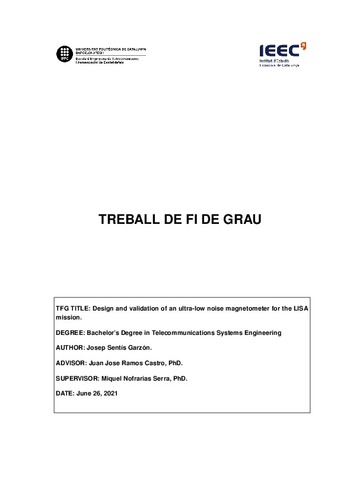Mostra el registre d'ítem simple
Design and validation of an ultra-low noise magnetometer for the LISA mission
| dc.contributor | Ramos Castro, Juan José |
| dc.contributor | Nofrarias Serra, Miquel |
| dc.contributor.author | Sentís Garzón, Josep |
| dc.contributor.other | Universitat Politècnica de Catalunya. Enginyeria Electrònica |
| dc.date.accessioned | 2021-07-08T13:22:34Z |
| dc.date.available | 2021-07-08T13:22:34Z |
| dc.date.issued | 2021-07-06 |
| dc.identifier.uri | http://hdl.handle.net/2117/348818 |
| dc.description.abstract | The dissertation main purpose is to design, validate and evaluate the performance of an ultra-low noise magnetometer based on an Anisotropic Magnetoresistance. The overall study covers insights over sub-millihertz frequencies, from theoretical and experimental inherent sensor noise performance to magnetic field measurements. The totality of the project intends to contribute to the Institute of Space Studies of Catalonia (IEEC) research for the development of the sensing equipment for the European Space Agency first space-based gravitational wave observatory called LISA. The mission will enhance our knowledge about the beginning, evolution, and structure of the Universe, grasping data from gravitational wave sources that are of strong interest to astrophysics, from black holes and galaxy formation to tests of general relativity and cosmology, detecting gravitational waves coming from colossal objects such as merging supermassive black holes at the cores of massive galaxies. However, the electromagnetic field coming from the spacecraft electronics could disturb the gravitational waves measurements, where this dissertation takes over. First and foremost, the project is put into context, introducing the nature of the gravitational waves and the need for their detection. Furthermore, the thesis presents the mission noise requirements, analysing the most suitable space-based magnetic sensor. Subsequently, the dissertation analyses, theoretically and experimentally, the anisotropic magnetoresistance performance, with the subsequent study of the magnetic field measurement and the evaluation of the back-action effect. The project has been built on the extensive previous effort made by the IEEC and its team, where further work will be done to conclude with this international project. |
| dc.language.iso | eng |
| dc.publisher | Universitat Politècnica de Catalunya |
| dc.rights.uri | http://creativecommons.org/licenses/by-nc-nd/3.0/es/ |
| dc.subject | Àrees temàtiques de la UPC::Aeronàutica i espai::Astronàutica |
| dc.subject.lcsh | Detectors |
| dc.subject.lcsh | Electromagnetic measurements |
| dc.subject.other | Sensors |
| dc.subject.other | Soroll |
| dc.subject.other | Magnetòmetre |
| dc.subject.other | Espai |
| dc.subject.other | Ones gravitacionals |
| dc.title | Design and validation of an ultra-low noise magnetometer for the LISA mission |
| dc.type | Bachelor thesis |
| dc.subject.lemac | Electromagnetisme -- Mesuraments |
| dc.subject.lemac | Detectors |
| dc.identifier.slug | PRISMA-161664 |
| dc.rights.access | Open Access |
| dc.date.updated | 2021-07-08T03:26:25Z |
| dc.audience.educationlevel | Estudis de primer/segon cicle |
| dc.audience.mediator | Escola d'Enginyeria de Telecomunicació i Aeroespacial de Castelldefels |
| dc.audience.degree | GRAU EN ENGINYERIA DE SISTEMES DE TELECOMUNICACIÓ (Pla 2009) |
| dc.contributor.covenantee | Institut d'Estudis Espacials de Catalunya |


